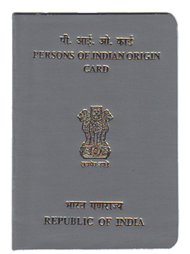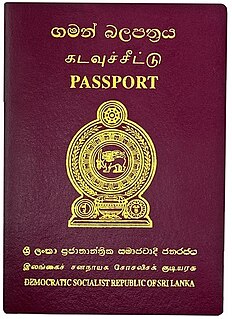This article has multiple issues. Please help improve it or discuss these issues on the talk page . (Learn how and when to remove these template messages) (Learn how and when to remove this template message)
|
| Persons of Indian Origin Card | |
|---|---|
 | |
| Date first issued | 15 September 2002 |
| Issued by | |
| Purpose | Identification |
| Expiration | 9 January 2015 (merged with OCI) |

Persons of Indian Origin Card (PIO Card) was a form of identification issued to a Person of Indian Origin who held a passport in a country other than Afghanistan, Bangladesh, Bhutan, China, Iran, Nepal, Pakistan and Sri Lanka. Accordingly, the Citizenship (Amendment) Act, 2003, made provision for acquisition of Overseas Citizenship of India (OCI) by the Person of Indian Origin (PIOs) of 16 specified countries other than Pakistan and Bangladesh. It also omitted all provision recognizing, or relating to the commonwealth citizenship from the principle Act. Later, the Citizenship (Amendment) Act, 2005, expanded the scope of grant of OCI for PIOs of all countries except Pakistan and Bangladesh as long as their home country allows dual citizenship under their local law. It must be noted here that the OCI is not actually a dual citizenship as the Indian constitution forbids dual nationality (Article 9).

Afghanistan, officially the Islamic Republic of Afghanistan, is a landlocked country located in South-Central Asia.. Afghanistan is bordered by Pakistan in the east and south; Iran in the west; Turkmenistan, Uzbekistan, and Tajikistan in the north; and in the far northeast, China. Occupying 652,000 square kilometers (252,000 sq mi), it is a mountainous country with plains in the north and southwest. Kabul is the capital and largest city. The population is 32 million, mostly composed of ethnic Pashtuns, Tajiks, Hazaras and Uzbeks.

Bangladesh, officially the People's Republic of Bangladesh, is a country in South Asia. While the country is the 92nd-largest in land area, spanning 147,570 square kilometres (56,980 sq mi), it is the world's 8th-most populous with nearly 163 million people, making it one of the most densely populated countries in the world. Bangladesh shares land borders with India to the west, north, and east, and with Myanmar to the east, with the Bay of Bengal to the south. Dhaka, the capital and largest city, is the nation's economic, political and cultural hub. Chittagong, the largest sea port, is the second largest city. The dominant geographic feature is the Ganges delta, which empties into the Bay of Bengal the combined waters of several river systems, including the Brahmaputra and the Ganges, with numerous criss-crossing rivers and inland waterways. Highlands with evergreen forests cover the northeastern and southeastern regions. The seacoast features the longest natural sea beach and most of the world's largest mangrove forest. The country's biodiversity includes a vast array of plants and wildlife, including the endangered Bengal tiger, the national animal.

Bhutan, officially the Kingdom of Bhutan, is a landlocked country in South Asia. Located in the Eastern Himalayas, it is bordered by the Tibetan Autonomous Region of China in the north, the Sikkim state of India and the Chumbi Valley of Tibet in the west, the Arunachal Pradesh state of India in the east, and the Indian states of Assam and West Bengal in the south. Bhutan is geopolitically in South Asia and is the region's second least populous nation after the Maldives. Thimphu is its capital and largest city, while Phuntsholing is its financial center.
Contents
On 9 January 2015, the Person of Indian Origin card scheme was withdrawn by the Government of India and was merged with the Overseas Citizen of India card scheme. [1] All currently held PIO cards are treated as OCI cards. PIO card holders will get a special stamp in their existing PIO card, saying "lifelong validity" and "registration not required", thus making them equal to existing OCI cards. [2] An extended deadline was given where the card could be converted for free to an OCI until 31 December 2017. [3]
PIO card holders can use their PIO card to travel to India until 31 March 2020. Effective 1 April 2020, PIO card holders' entry to India will be refused. [4] [5]













